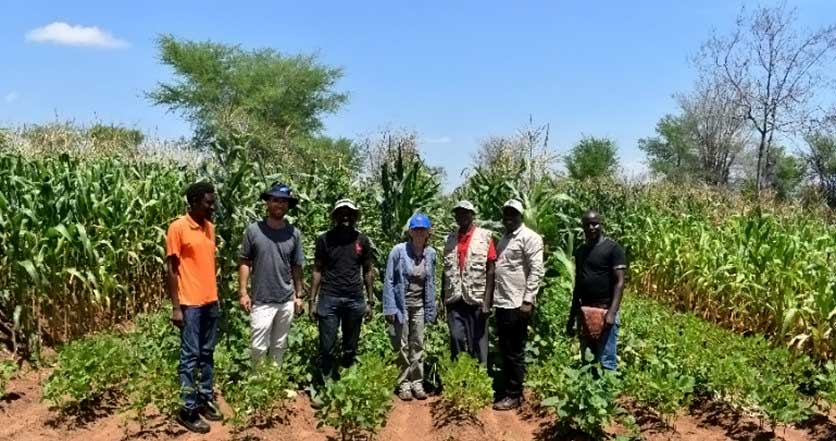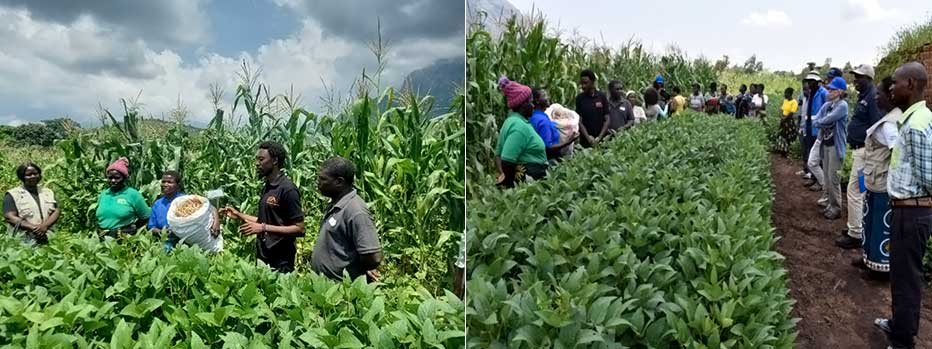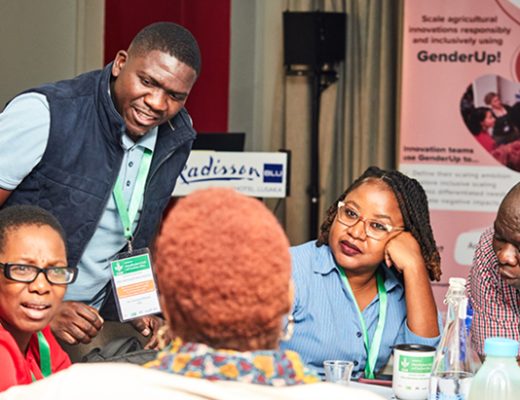The EU-DeSIRA Malawi team comprising Program Manager Marco Vacirca and Finance Manager Chapresto Cortes Maria visited on-farm trials at Mulanje and Salima and on-station at Chitala Research Station from 6 to 9 March. The CGIAR centers showcasing their trials were IITA, CIMMYT, CIP, CIAT, ICRISAT, IFPRI, WorldFish, and ICRAF.

DeSIRA (Climate-smart innovations to improve productivity, profitability, and sustainability of agriculture and food systems in Malawi through multidisciplinary research) is a five-year European Union-funded research project that seeks to address challenges in the smallholder agri-food system in Malawi by developing climate-smart integrated technological options adapted to local conditions and the farmers’ realities. The goal of the project is to improve productivity, profitability, and sustainability of agriculture and food systems in Malawi through three key objectives:
- Develop climate-resilient integrated technological innovations to address the complex and diverse challenges affecting the agricultural and food systems in Malawi
- Enhance understanding of the opportunities and constraints for the uptake of integrated technology options by farmers
- Inform policymakers and scaling partners about the potential of integrated technological options to contribute to climate resilience and sustainability, and the enabling environment required for adoption
Eight CGIAR centers—Alliance Bioversity-CIAT, CIMMYT, CIP, ICRAF, ICRISAT, IFPRI, IITA, and WFC—and a European partner—University of Liege—are implementing the action, working closely with the Department of Agricultural Research Services (DARS). The activities of the CGIAR centers and the EU partners are being coordinated by The International Potato Center (CIP), which is leading the consortium.
The IITA-Malawi DeSIRA team presented two trials on integrated soil fertility management solutions in maize-cowpea and cassava-cowpea intercropping arrangements. These technologies are in the advanced stage of being released to the Malawi smallholder farmers. They have undergone two seasons of on-station and one season of mother-baby on-farm trial evaluations. Currently, on-farm baby trials are being implemented in seven districts of Malawi, representing various agro-ecological zones. The study also involves farmer participatory evaluation and economic evaluation of the technologies.

EU DeSIRA Programme Manager in Malawi, Marco Vacirca, on one of the on-farm trials in Salima at Mr. Levson Chulu’s farm.
During the EU delegation visits, farmers interacted with the team. A smallholder farmer in Mulanje, Rose Maluwa of Thuchira Extension Planning Area (EPA), when asked which of the cassava-cowpea technologies she would prefer and why, said: “The 1:1 and 2:2 arrangement of cassava-cowpea with 60 kg N/ha applied to cassava and 30 kg N/ha applied to cowpea were the best. This is because the biomass from cowpea is robust and would later drop off, thus forming manure and adding nutrients to the soil; this type of vegetative growth also offers soil cover and smothers weeds. In addition, the green larges leaves from cassava and cowpea are vegetables.”
At Salima, a smallholder farmer, Levson Chulu of Chinguluwe EPA, noted: “Cowpea is a legume that supplements our diet and gives us proteins. It also reduces the Striga population: look at the sole cropping maize without fertilizer application versus the maize-cowpea receiving 200 kg N/ha for maize and 30 kg N/ha for cowpea; the Striga population in the sole maize crop is more, yet the intercropping has none.”

On the left, farmers: Mrs. Margret Khotani (in green t-shirt), Mrs. Jenesi Mukhitho (in blue t-shirt) of Thuchira EPA in Mulanje explaining to the EU delegation the benefits of IITA’s maize-cowpea intercropping and IITA’s Research technician, Mr Peter Kadwala (in black t-shirt). On the right, the EU delegation and DeSIRA team members listen to their presentation. The maize-cowpea trial is the one behind the farmers.
During the visit, the EU-Malawi delegation commended CGIAR centers, emphasizing the need for some of the technologies to be released by the Malawi Agricultural Technology Clearing Committee (ATCC) before the project winds up in 2024. The IITA-Malawi team is on course to finalize the requirements of the Malawi government to release a technology—the second season of on-farm trials. IITA is also tasked with conducting farmer participatory evaluation of all the DeSIRA-Malawi trials and economic evaluations of all the technologies from all the participating CGIAR centers (IITA, CIMMYT, CIP, CIAT, ICRISAT, IFPRI, WorldFish and ICRAF).


No Comments